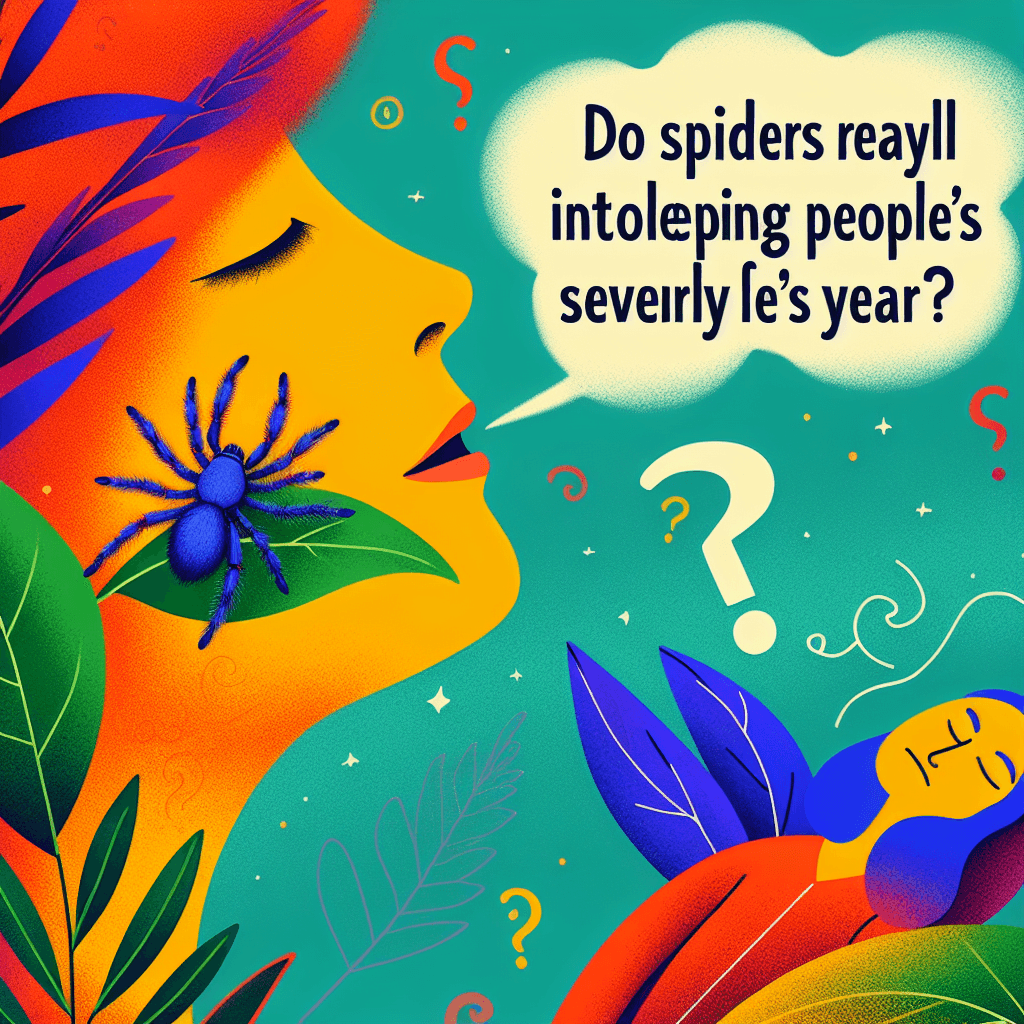The Eight-Legged Lie You've Been Told Since Childhood
That horrifying 'fact' about swallowing spiders in your sleep isn't just a myth—it was a deliberate deception. The true story of who created this lie, and why, is even more bizarre than the fiction you were told.


Too Long; Didn't Read
TLDR: The belief that you swallow spiders in your sleep is a myth. A sleeping human's vibrations, breathing, and snoring are a huge deterrent for any spider, which sees you as a dangerous predator, not a place to explore.
Sleep Soundly: Do Spiders Really Crawl Into Sleeping People's Mouths Several Times a Year?
It's a "fact" whispered around campfires, shared gleefully online, and lodged firmly in the back of many minds: the unsettling idea that the average person swallows multiple spiders per year in their sleep. It taps into a common fear – arachnophobia – and the vulnerability we feel when unconscious. But how much truth is there to this creepy claim? Do spiders really view our sleeping mouths as cozy resting spots or accidental entryways? This blog post dives deep into the evidence, separating arachnid fact from fiction, to definitively answer the question: Do spiders really crawl into sleeping people's mouths several times a year? Prepare to have a pervasive myth untangled.
Unraveling the Web of Myth: Where Did This Idea Come From?
The "spiders in mouth" statistic (often quoted as eight per year, though the number varies wildly) seems to have crawled out of the early internet ether. One often-cited origin story attributes it to a 1993 PC Professional article by columnist Lisa Holst, who supposedly fabricated "facts" – including the spider statistic – to demonstrate how easily people accept information found online. While the existence of this specific article is debated, the story itself highlights a key point: the myth spread like wildfire precisely because it was sensational and preyed on common fears, not because it was based on evidence. It became a classic example of pseudo-fact, repeated so often it felt true.
Why Your Mouth Isn't a Spider Motel
From both the spider's and the human's perspective, the scenario of a spider deliberately crawling into a sleeping person's mouth is highly improbable.
The Spider's Point of View
- Vibration Alerts: Spiders are highly sensitive to vibrations. They use these vibrations to detect prey, potential mates, and, crucially, danger. A sleeping human is far from still – we breathe, snore, shift position, and our hearts beat. To a spider, a sleeping human likely resembles a massive, unpredictable, noisy landscape fraught with danger, not a safe haven.
- Not on the Menu: Humans are not spider prey. We are enormous compared to them. A spider has no biological reason to approach a large, breathing creature like a human, especially not its mouth.
- Seeking Safety: Most spiders prefer quiet, dark, undisturbed locations where they are less likely to encounter predators. A warm, moist, vibrating cave emitting puffs of carbon dioxide (your mouth) is the opposite of their preferred habitat.
The Human Factor
- You're Not a Log: Even in deep sleep, humans are sensitive. The light touch of spider legs on the sensitive skin of the face would likely cause a reaction, waking the person or causing them to brush the intruder away unconsciously.
- Reflexes: Imagine the sensation. Even if a spider somehow reached the lips, the likelihood of it entering the mouth without triggering a gag reflex or a coughing fit is minimal. Swallowing requires conscious or reflexive action usually prompted by food or saliva, not a light, multi-legged intruder.
What Do the Experts Say?
Ask any arachnologist (spider expert) or entomologist, and they will almost universally dismiss this claim as a myth. Experts like Rod Crawford, Curator of Arachnids at the Burke Museum of Natural History & Culture, have spent years debunking this very idea. They emphasize that there is:
- No Scientific Evidence: There are no documented cases or scientific studies confirming that people regularly swallow spiders in their sleep.
- Behavioural Inconsistency: Spider behaviour simply doesn't align with the idea of them seeking out human mouths. They are far more likely to avoid us.
The overwhelming consensus in the scientific community is that swallowing spiders during sleep is an urban legend with no basis in biology or observed behaviour.
Conclusion: Sleep Easy, Your Mouth is Safe
The notion that spiders routinely crawl into our mouths while we sleep, leading us to swallow several per year, is a persistent but unfounded myth. It likely originated as an example of online misinformation and gained traction due to its sensational nature and connection to arachnophobia. From a spider's perspective, a sleeping human is a source of terrifying vibrations and potential danger, not a welcoming environment. For humans, our sensitivity and reflexes make unknowingly swallowing a spider highly improbable. Experts overwhelmingly agree that this claim lacks any factual basis. So, while spiders might share our homes, you can rest assured they aren't actively seeking out your mouth for a midnight snack or shelter. Sleep tight, and don't let the myth bite.


